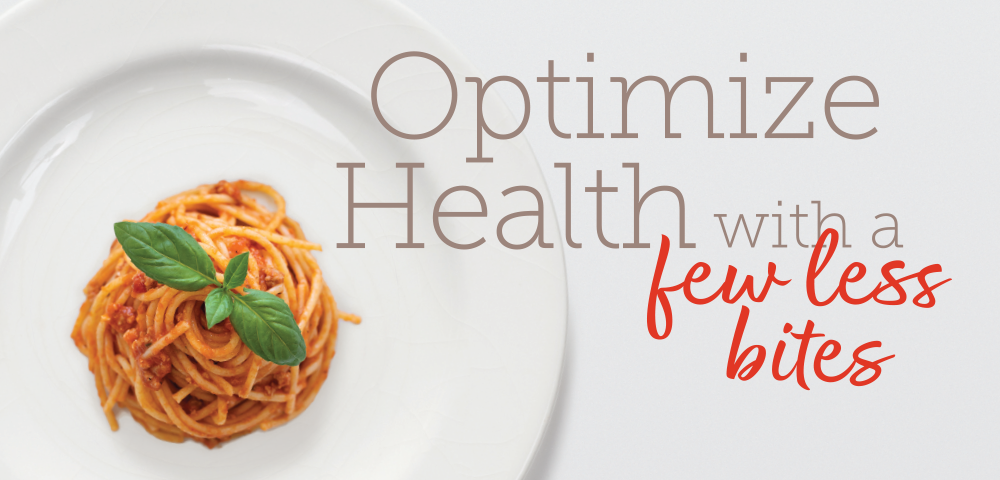
Are you ready to optimize your health with fewer bites?
What if I said that cutting back on a few spoonfuls of your favorite pasta dish could have notable health advantages? While the typical Western diet high in calories is associated with obesity, diabetes, and heart disease, research on calorie restriction without malnutrition has shown improved health span and lifespan in many animals and humans. Calorie restriction is a promising and practical step to a longer, healthier life with delayed onset of age-related diseases.
Are you ready to optimize your health with fewer bites?
CALORIES AND CALORIE RESTRICTION 101
Calories are the body’s energy source commonly obtained from foods, including proteins, carbohydrates, and fats. Our cells need this energy to perform daily tasks like walking, breathing, and sleeping. Over the years, there have been plenty of misconceptions about calories. Here are three essential facts about calories.
- The body’s ideal intake of calories depends on many factors, including age, sex, activity level, and body size
- Not all calories are the same (calories from whole foods are best!)
- Excess and too little calorie intake can significantly impact health
Calorie restriction is a well-balanced dietary strategy that lowers calorie consumption by 20–40% without stripping it of its essential nutrients. As an example, let’s consider Okinawa, Japan, identified as one of five Blue Zones where people live long lives. Compared to the U.S. population, older Okinawans have shown 80% less coronary heart disease and 40% less cancer mortality. One attributing factor is a diet lower in calories. Studies have suggested that Okinawan adults consume about 40% fewer calories than the average adult in the U.S.
CALORIE RESTRICTION OPTIMIZES YOUR LIFE
Several hallmarks, including mitochondrial dysfunction, genome instability, and impaired nutrient sensing, often accompany aging. With over 80 years of research, calorie restriction is proving to be a dietary strategy that overcomes these markers by:
- Reducing inflammation
- Protecting against oxidative stress
- Decreasing glucose and insulin levels
- Activating AMPK
- Increasing NAD+
- Repairing DNA
Longevity and quality of life
A two-year study called CALERIE (Comprehensive Assessment of Long-term Effects of Reducing Intake of Energy) investigated the benefits of calorie restriction in healthy adults without obesity. Although a 25% calorie restriction diet was prescribed, participants achieved approximately 12% reduced calorie intake. Interestingly, this moderate calorie reduction was accompanied by a 10.4% sustained weight loss, improved muscle health, and a slower pace of aging by 2–3%. Improved mood, general health, sexual drive, sleep duration, and reduced tension were also observed.
Cardiometabolic health
Cardiovascular disease is a leading cause of mortality worldwide and a consequence of multiple risk factors such as hypertension and dyslipidemia. Reduced calorie intake has been shown to improve many cardiometabolic risk factors, including waist circumference, blood pressure, HDL cholesterol, LDL cholesterol, triglycerides, insulin resistance, glucose control, and inflammation.
Brain health and cognition
Calorie restriction supports brain health by improving neurogenesis, synaptic plasticity, brain structure and function, and neuroprotection. Working and verbal memory improvements have been observed in individuals following moderate calorie restriction. The cognitive benefits have been shown to occur over short-term and long-term periods because of decreased inflammation and oxidative stress, increased neurotrophic factors, improved neurotransmitter production, and support of the gut-brain axis.
WHAT’S NEXT?
For some, calorie restriction can be difficult and, if done incorrectly, result in adverse effects such as impaired metabolism and nutrient deficiencies. If you are wondering how moderate calorie restriction can impact your health, take a test drive by starting with these simple steps:
- Eat slowly until you are 80% full
- Use smaller plate sizes and skip second helpings
- Choose water instead of sugary drinks, specialty coffees, and alcoholic beverages
- Replace processed snacks such as chips and cookies with high-fiber fruits and vegetables
- Swap processed meats for high-quality proteins at every meal
- Incorporate meal replacements and multivitamin-mineral formulas to support nutrient levels
Meal replacements provide the nutrition of a full meal with balanced levels of macro- and micronutrients. Well-designed meal replacements can satisfy appetites, reduce cravings, build strong muscles, and support healthy weight management, which are significant benefits for healthy aging and longevity.
Multivitamin-mineral formulas provide a broad spectrum of vitamins, minerals, and other vital ingredients to help prevent nutrient deficiencies that often occur as we age. When shopping for multi-vitamins, look for one with easily absorbable nutrients designed for your life stage.
It will take little time to notice how fewer yet more meaningful bites can optimize your life and health!
CALORIE RESTRICTION MIMETICS
Supplements that have similar effects as calorie restriction to impact longevity:
- Resveratrol
- Quercetin
- Berberine
- Curcumin
- Green tea












